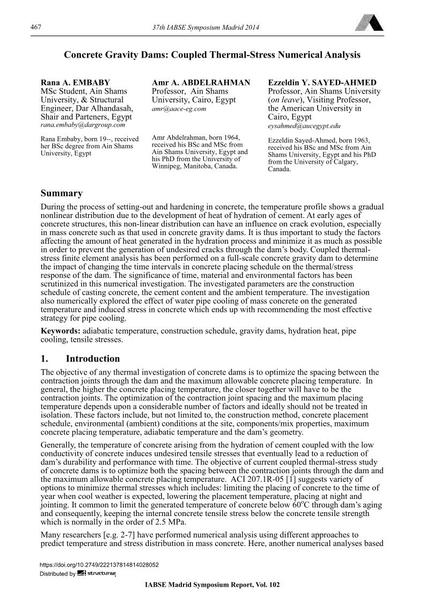Concrete Gravity Dams: Coupled Thermal-Stress Numerical Analysis

|
|
|||||||||||
Détails bibliographiques
| Auteur(s): |
Rana A. Embaby
Amr A. Abdelrahman Ezzeldin Y. Sayed-Ahmed |
||||
|---|---|---|---|---|---|
| Médium: | papier de conférence | ||||
| Langue(s): | anglais | ||||
| Conférence: | IABSE Symposium: Engineering for Progress, Nature and People, Madrid, Spain, 3-5 September 2014 | ||||
| Publié dans: | IABSE Symposium Madrid 2014 | ||||
|
|||||
| Page(s): | 467-474 | ||||
| Nombre total de pages (du PDF): | 8 | ||||
| Année: | 2014 | ||||
| DOI: | 10.2749/222137814814028052 | ||||
| Abstrait: |
During the process of setting-out and hardening in concrete, the temperature profile shows a gradual nonlinear distribution due to the development of heat of hydration of cement. At early ages of concrete structures, this non-linear distribution can have an influence on crack evolution, especially in mass concrete such as that used in concrete gravity dams. It is thus important to study the factors affecting the amount of heat generated in the hydration process and minimize it as much as possible in order to prevent the generation of undesired cracks through the dam’s body. Coupled thermal- stress finite element analysis has been performed on a full-scale concrete gravity dam to determine the impact of changing the time intervals in concrete placing schedule on the thermal/stress response of the dam. The significance of time, material and environmental factors has been scrutinized in this numerical investigation. The investigated parameters are the construction schedule of casting concrete, the cement content and the ambient temperature. The investigation also numerically explored the effect of water pipe cooling of mass concrete on the generated temperature and induced stress in concrete which ends up with recommending the most effective strategy for pipe cooling. |
||||


